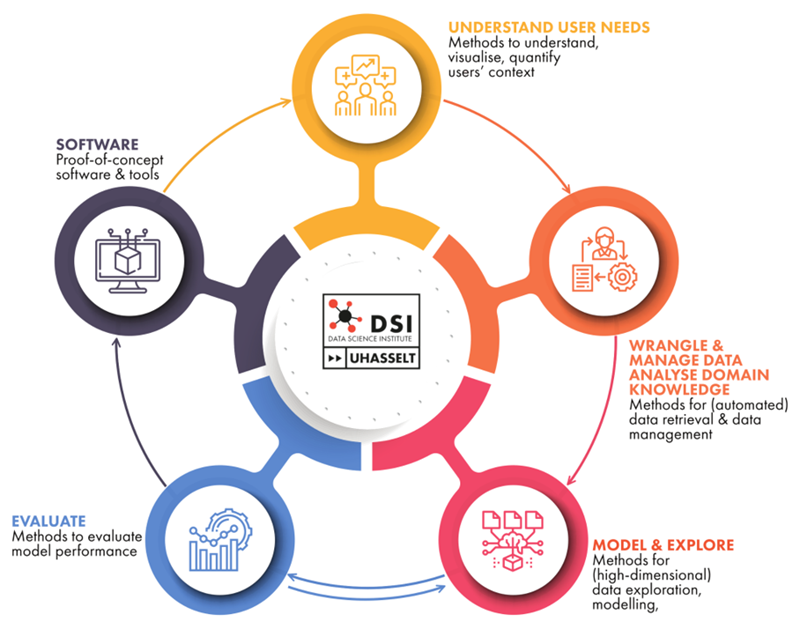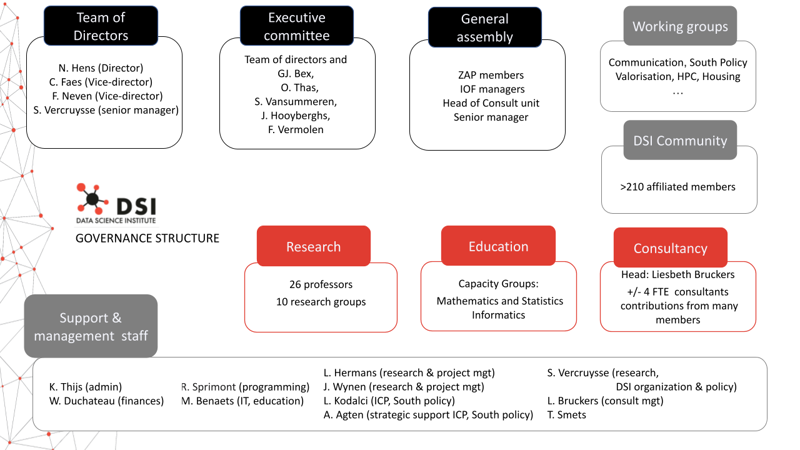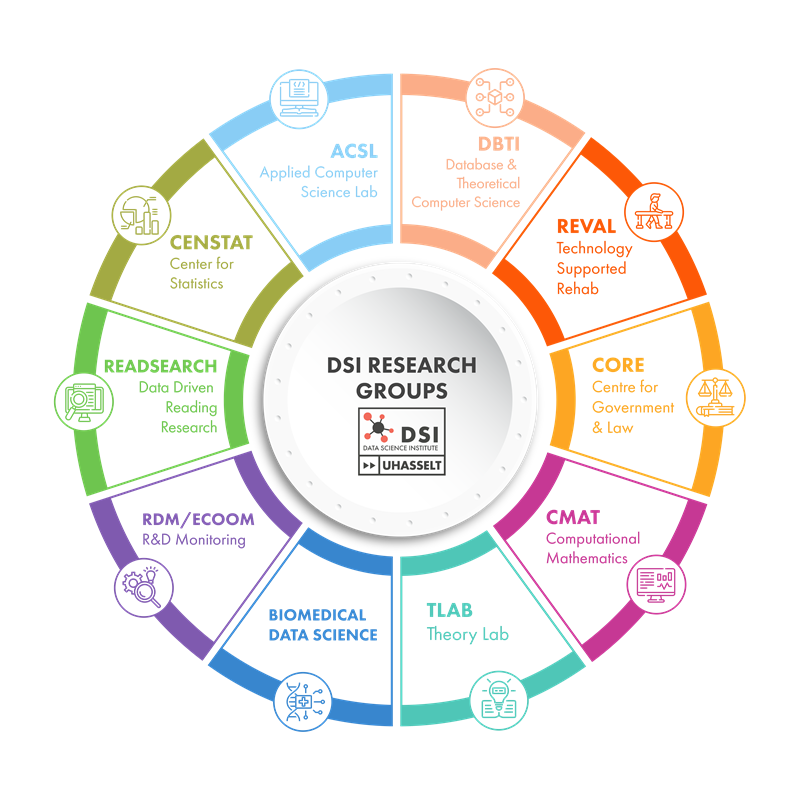About DSI
DSI is the newest of four spearhead research institutes at Hasselt University, representing research excellence in the field of data science. Through intense connections with local and international stakeholders, DSI contributes to the university’s civic mission.
Since the end of 2019, the Data Science Institute of UHasselt, unites data science researchers active in subdomains of data science, who were previously scattered across the university. It is the individual researchers’ expertise and interests that gives character to the institute. It is a people-driven institute, committed to data-related challenges, fundamental innovations and applicable solutions.


View the content of this page

Mission and Vision
Grounded in a civic university and building on the expertise and interests of its members, the mission of DSI is to facilitate the data-driven future from a fundamental and applied scientific perspective and with a footprint in high quality research, teaching and civic collaboration.
This mission is supported by three strategic choices:
DSI’s main activities are research, education and civic collaboration which form three interconnected pillars. The quality of and interaction between these pillars are important drivers of DSI’s success. We invest in fundamental as well as civic-driven data science research and consider them of equal value. Individual researchers have the freedom to navigate across the spectrum.
Our mission and strategic choices are reflected in DSI’s key guiding principles:
- DSI unites data science researchers across disciplines and domains. Individuals’ expertise give character to the institute.
- DSI’s impact ranges from scientific excellence to civic relevance.
- DSI delivers high-quality trained data scientists, critical and engaged global citizens.
- DSI collaborates with universities, research centers, governments, businesses and societal organisations in order to enhance knowledge on local, regional and global challenges, support decision-making processes and develop new ideas and solutions.
- DSI acts as a catalyst for data-driven research valorisation and as a sounding board for discussion on the role of data in society.
This all supports the vision that DSI broadens data scientists’ perspective and range of opportunities and as a whole, helps the university and society to make the best use of the increasing value of data.
Our scientific and technological offer to potential collaborators covers the full data science cycle as shown below. The concept of the data science cycle helps to make services and expertise of DSI visible and demonstrates the interdisciplinary nature of DSI.

DSI in numbers
Organisation and members

DSI unites researchers and support staff across 10 research groups:

|
Professors |
Predoctoral and Scientific Researchers |
Postdoctoral and Senior Researchers |
|---|---|---|
|
|
|
|
|
|
|
|
|
|
|
|
|
|
|
|
|
|
|
|
||
|
Emeritus professors associated with DSI:
- Marc Aerts
- Herman Callaert
- Paul Janssen
- Emmanuel Lesaffre
- Noël Veraverbeke
- Marc Gyssens
Strategic partnerships
I-Biostat
On 10 September 2008, the Leuven and Hasselt Rectors signed the Interuniversity Institute for Biostatistics and statistical Bioinformatics (I-BioStat) agreement. For two decades, the Hasselt and Leuven entities have assumed responsibility over education, scientific consulting, and research in biostatistics, bioinformatics, and methodological statistics. Over time, strong collaborative links have been forged between both. CenStat, now part of DSI, joined forces with the Leuven Biostatistics and statistical Bioinformatics Centre in an interuniversity institute. I-BioStat extends further the two divisions’ activities in biostatistics, statistical bioinformatics, and genetics. This is enabled by means of additional appointments at professorial and postdoctoral level, and through project-based investments. Jointly, Leuven and Hasselt are creating a well recognized platform.
Feel free to visit the I-BioStat website
Vacancies
Current vacancies other institutes
Current vacancies other institutes
- .
Past vacancies
Past vacancies
DSI
- Innovation manager / Business developer Data Science Institute, Apply up to 04/11/2024
- PhD student statistics and infectious disease modeling, 29/8/23
- Researcher-expert Statistician for Modelling of Environment and Health UHasselt - received 23/12/2022
- Researcher-expert Network Epidemiology UHasselt - received 22/12/2022
- Researcher-expert Mathematical Modelling UHasselt - received 22/12/2022
- PhD position, Vito and UHasselt- received 17/10
Other institutes
- Junior reseacher Game Theory, Apply up to 15/11/2025
- Junior researcher machine learning, Apply up to 15/11/2025
- Praktijkassistent- vakgroep Criminologie, Strafrecht en Sociaal Recht, Apply up to 5/11/2025
- Senior Scientist Manufacturing Statistics (AI/ML), Apply up to 25/08/2025
- Senior Scientist Manufacturing Statistics, Apply up to 25/08/2025
- Analist demografie en bevolking, VSA (Statistiek Vlaanderen), Brussels, Belgium, 14/07/2025
- Biostatistician, UZBrussels, 21/01/2025
- Attachment in Vulnerable Infants: Physiology and Family Synchrony, KU Leuven, Belgium, 11/06/2025
- Teaching assistant Econometrics and Time Series Analysis ,Hasselt University, Belgium, 28/04/2025
- Fairification Officer, Sciensano, Belgium
- IT & Data Driven Jobs , Sciensano, Belgium
- PhD position, Maastricht University, The Netherlands; received 27/01/2025
- Data-analist, Vlaams Mensenrechteninstituut, 12/11/24
- Full-time academic in High Dimensional Spatia-Temporal Data, UCLouvain, received 1/10/24
- Full-time academic in Statistical and Bayesian Learning, UCLouvain, received 1/10/24
- Various positions at GSK, GSK, received 20/9/2024
- PhD Frailties in Multiple Sclerosis, University of Tasmania, received 11/9/2024
- Project Manager - The Social Study, KULeuven, received 29/8/2024
- Data Manager/Statistician, UAntwerp, received 18/7/24
- Doctoral Fellow, UGhent, received 4/7/24
- Voorzitter Werkgroep Advies en Planning Jeugdhulp Limburg, received 19/6/24
- Various positions, GIGA Institute, Liège, received 12/6/24
- Postdoctoral position, ULiège, received 7/5/2024
- SNE/Biostatistician Specialist, EMA, Amsterdam, The Netherlands, received 6/5/2024
- Adviseur - Trusted Third Party, Nationale Bank van België, received 24/4/2024
- ZAP vacature Toegepaste Wiskunde, KULeuven, received 5/4/2024
- Data Scientist/Statisticus monitoring natuurlijk milieu, INBO, received 2/4/2024
- Statisticus, INBO, Received 2/4/2024
- PhD position, VITO, Belgium, received 8/3/2024
- Fellowship in Biostatistics, EORTC, Brussels, Belgium, received 4/3/2024
- Senior statistician, EORTC, Brussels, Belgium, received 4/3/2024
- PhD student in meta-research in finance, CMK, UHasselt, received 4/3/2024
- Statisticus/Data Scientist, INBO, received 1/3/2024
- Postdoc position, EMS, received 27/11/2023
- Statistician, Karolinska Institutet, Sweden, received 15/11/2023
- Projectleider milieu en gezondheid, Provincie Antwerpen, received 6/11/2023
- Projectleider-arts, Provincie Antwerpen, received 6/11/2023
- Biostatistician or Lecturer in biostatistics (pdf, 144 KB), Utrecht University, Netherlands, received on 17/10/23
- Scientific Officer Bioinformatics, ECDC, EU, received 12/10/23
- Data Scientist, ENGIE, Brussels, Belgium, received 9/10/2023
- Fellowship in Biostatistics, EORTC, Brussels, Belgium, received 29/8/2023
- Biostatisticien, Institut Gustave Roussy, Paris, France, received 22/8/2023
- PhD position, Medical University of Graz, Austria and Antwerp University Belgium; received 21/8/23
- Collaborating Expert, European Medicines Agency - received 1/8
- Postdoctoral fellow in biostatistics/bioinformatics, Icahn School of Medicin, Mount Sinai, US - received 20/6
- Professor in Financial Mathematics or Mathematical Statistics, KULeuven - received 12/6
- Bioinformatician / Data Scientist, Maastricht University - received 25/5
- Doctoral Research in Lifestyle EpiGenetics and Male Fertility, KULeuven - received 8/5
- Doctoral researcher in Bioinformatics, KULeuven - received 8/5
- FLAMES Administratief medewerker, VUB - received 3/4
- PhD position in Biostatistics and Machine Learning - received 17/3
- Machine learning engineer, Statistiek Vlaanderen - received 17/3
- Biostatistics consultant, L-BioStat, KULeuven - received 7/3
- Predoctoral grants, University of Navarra, Spain - received 31/1
- Lecturer in Data Science, Newcastle University, U.K. - received 9/1
- Data Scientist, ZOL, Belgium - received 4/1
- Datamanager Host, ZNA, Belgium - received 12/12
- Projectleider gezondheid, PIH, Antwerp, Belgium - received 6/12/
- Data analist - onderzoeker, VIKZ, Belgium - received 2/12
- Wetenschappelijk medewerker, CeSO, KULeuven, Belgium - received 14/11
- Statistical Modeler, PD-value, Utrecht, The Netherlands - received 14/11
- PhD position, University of East Anglia, U.K. - received 8/11
- Statistician (vaccine) Epidemiology, P95 - received 26/9
- Four positions in Statistics, Biostatistics or Data Science, University of Waterloo, Canada - received 14/9
- Position in Actuarial Science or Quantitative Finance, University of Waterloo, Canada - received 14/9
- Biostatistician and Director, Argenx, Belgium - received 17/8
- Biostatisticien, Institut Gustave Roussy, France - received 20/7
- R&D researcher Environment & Health, VITO, Belgium - received 18/7
- Data Engineer, VITO, Belgium - received 18/7
- Doctoral Fellow, UGhent, Belgium
- Data Engineer, Melexis, Belgium
- Lead Data Engineer, Melexis, Belgium
- Senior statistician vaccine epidemiology, P95, Belgium
- Statistical Research Fellow, UCB Pharma
- PhD positions - Horizon 2020, University La Coruna, Spain
- Wu Tsai Postdoctoral Fellowships, Yale University
- PhD positions in Data Science, Quantum Leap Africa
- Several positions in Data Science and Statistics
- PhD position in Statistics, Utrecht University, The Netherlands
- Postdoctoral researcher in statistics; Johnson&Johnson, Belgium
- 4 job offers, Flemish Statistical Authority
- PhD candidates Joint PhD, KULeuven - Maastricht University
- Various positions at FWO - FNRS, Belgium
- Statisticus / Data Scientist, INBO, Flanders
- Research assistant, KULeuven
- Senior scientist disaster impact, UCLouvain
- Postdoctoral Fellowships, UMBC, USA
- PhD candidate, Maastricht University, The Netherlands
- Data analist, FOD Volksgezondheid
- Professor in Mathematical Statistics, Ghent University, Belgium
- Postdoctoral researcher ERC project DISCONNECT, Ghent University, Belgium
- Analytical programmer, P95, Belgium
- Wetenschapper, Sciensano, Brussels
- Experienced researcher, Sciensano, Brussels
- Senior Statistician, Janssen R&D
- Data analist/Project manager, IMA
- Teaching assistant, Ghent University
- Data analist - Project Manager, IMA-AIM
- Tenure track lecturer Mathematical modelling of infectious disease epidemiology
- Tenure track lecturer Machine Learning
- Researcher-Expert Data Science Consultant
- Two PhD positions: Researcher in Statistics/Biostatistics/Bioinformatics
- Postdoctoral Researcher in Statistics
- Researcher-Expert in Data Sciences - Health Data Infrastructures
- Tenure track professor of Medical Imaging Research, Universität Graz, Austria
- PhD Student Visual Analytics (closed)
The UHasselt Data Science Institute in Belgium (www.uhasselt.be/dsi) fosters collaboration among data science experts across disciplines. As part of this new institute, the Visual Data Analysis Lab is interested in applying interactive data visualisation to support data scientists in gaining insight in their complex data.
The UHasselt Data Science Institute in Belgium (www.uhasselt.be/dsi) fosters collaboration among data science experts across disciplines. As part of this new institute, the Visual Data Analysis Lab is interested in applying interactive data visualisation to support data scientists in gaining insight in their complex data.
- Associate Professor / Professor / Full Professor Research Position in Data Management and Data Wrangling
The Data Science Institute brings together researchers working in the broad field of data science across faculties and research groups at Hasselt University. The main objective is to facilitate the data-driven future. The institute performs research across the full spectrum from fundamental to applied; its impact ranges from scientific excellence to civic relevance. The institute's success is measured in achieving this goal by continuous growth in impact and reputation.
The UHasselt website has information on life on campus (student house, visa, costs, health care, etc).
Contact
Sarah Vercruysse

Agoralaan Gebouw D - B -3590 Diepenbeek
Office E109
Liesbeth Bruckers

Agoralaan Gebouw D - B -3590 Diepenbeek
Office E111
Location
UHasselt Campus Diepenbeek - building D

Agoralaan - gebouw D,3590 Diepenbeek, Belgium
The institute is located in the main university building (Building D) at the Diepenbeek campus.
By public transport
The institute can be easily reached from Hasselt train station using bus services 20A (to Maastricht), 36 (to Genk via Diepenbeek) or 45 (to Maastricht and Maaseik). There is a busstop "Diepenbeek Universiteit" near the main building of the Diepenbeek campus where DSI is located.
By Car
There is a visitor's car park at the side of the main building. Ring the bell at the front barrier, then leave your car for a moment near the main building. At reception you will be given a day code for the barrier and a plan you can use to find your way to the visitor's car park.
When you arrive on-site
To get to the institute itself, take the main entrance of building D, diagonally cross the agora, and take the steps to the first floor where the institute is located.
